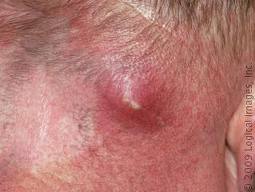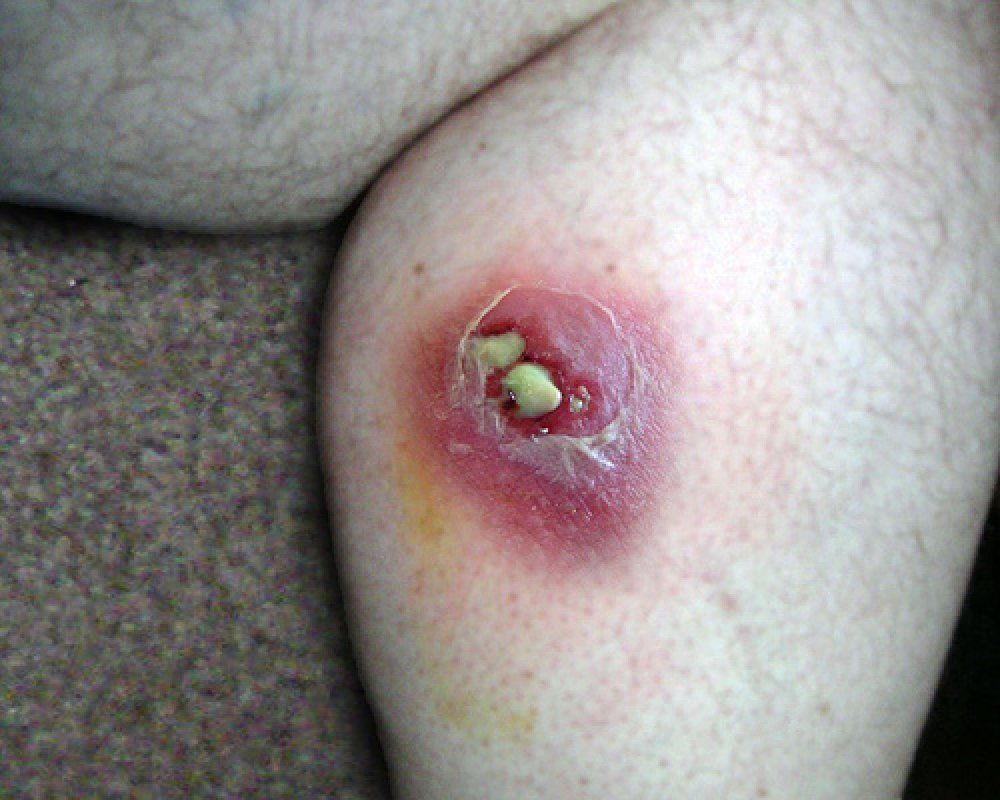It is not safe to pop spider bites. Doing so can lead to infection and worsen the condition.
Spider bites, a common concern for many, often lead to discomfort and worry. The urge to pop them, similar to how one might treat a pimple, is a natural reaction. Yet, this approach can introduce bacteria into the wound, increasing the risk of an infection.
Given the variety of spiders and the potential for allergic reactions or more severe symptoms, proper care is crucial. Seeking medical advice is always the best course of action. This ensures that any risk of complications is minimized and that the bite receives appropriate treatment. Understanding the risks associated with popping spider bites can help prevent unnecessary complications, promoting a safer and more informed approach to bite management.

Credit: www.reddit.com
Introduction To Spider Bites
Spiders can be friends or foes. Spider bites are rare but can happen. Most bites are harmless. Some need care. Knowing symptoms and dangerous spiders is key. Let’s explore spider bite safety together.
Common Symptoms
- Redness at the bite site
- Swelling around the area
- Mild pain or itching
- Blister formation
Most spider bites cause minor symptoms. Seek medical help for severe reactions.
Types Of Spiders To Watch Out For
| Spider Type | Region | Severity |
|---|---|---|
| Black Widow | North America | High |
| Brown Recluse | Central & Southern US | High |
| Hobo Spider | Northwest US | Medium |
Black widow and brown recluse bites need immediate medical attention. Their venom can be dangerous. Hobo spider bites are less severe but should be watched.

Credit: www.suncoastucc.com
Myths Vs. Facts: Popping Spider Bites
Many people wonder about the safety of popping spider bites. This section debunks myths and presents facts about this common concern.
Popular Misconceptions
Spider bites often cause panic. Some believe popping them is the best solution. This is a misconception. Popping can lead to infections and scarring.
- Popping speeds up healing: False.
- Spider bites contain venom that must be released: Incorrect.
- All spider bites require medical attention: Not always true.
What Experts Say
Medical professionals advise against popping spider bites. They recommend cleaning the area and applying antiseptic. If symptoms worsen, seek medical help.
| Action | Recommendation |
|---|---|
| Cleaning | Use soap and water |
| Reducing Swelling | Apply ice pack |
| Medical Attention | Seek if symptoms persist |
In summary, keep the bite clean, use ice for swelling, and monitor for serious symptoms. Popping is not safe and is not recommended.
Potential Risks Of Popping Spider Bites
Potential Risks of Popping Spider Bites can be serious. Many people think popping a spider bite is a quick fix. This is not true. Popping can lead to more harm than good. Let’s explore the risks.
Infection Risks
Breaking the skin of a spider bite can invite germs. Our skin is a barrier against infection. Popping a bite breaks this barrier. This makes it easy for bacteria to enter. Once inside, bacteria can cause an infection. Signs of infection include redness, swelling, and pus. To avoid this, keep the bite clean and untouched.
Scarring And Tissue Damage
Popping a spider bite can also lead to scarring. The action of popping can damage skin tissue. This damage can make the healing process longer. It can also leave a permanent scar. In some cases, tissue damage is severe. It can affect deeper layers of the skin. Always allow a spider bite to heal on its own to avoid these issues.
- Keep the area clean and dry to promote healing.
- Use a cold compress to reduce swelling and itching.
- Seek medical attention if the bite worsens or signs of infection appear.
When To Seek Medical Attention
Knowing when to seek medical attention for spider bites is crucial. Not all spider bites require a visit to the doctor. Yet, some signs demand immediate care. This part of our guide helps you understand those signs.
Signs Of Severe Reactions
Some spider bites can cause serious reactions. Look for these signs:
- Difficulty breathing: This is urgent.
- Swelling of the face or mouth: This can be dangerous.
- Rash or itching spreading: Shows a severe reaction.
- Muscle pain or cramps: A bad sign, especially in kids.
- Fever or chills: Your body is fighting hard.
- Nausea or vomiting: Shows your body is upset.
Professional Treatment Options
Doctors have many ways to help with spider bites. Here are some:
- Cleaning the bite site: Stops infection.
- Medicine for pain: Helps you feel better.
- Antibiotics: Fight off germs.
- Antivenom: For very bad bites.
Remember, not all spider bites are the same. Some heal on their own. Others need a doctor’s help. Always watch for severe signs. They tell you when to get help.
Safe Alternatives To Popping
Squeezing spider bites might seem like a quick fix. Yet, it can lead to infection. Instead, try safe methods to reduce swelling and pain. Below are effective, gentle alternatives.
Home Remedies
- Cold Compress: Apply ice wrapped in cloth. It eases pain and swelling.
- Aloe Vera: Natural anti-inflammatory. Soothes the skin.
- Baking Soda: Mix with water. Creates a paste. Reduces itchiness.
- Witch Hazel: Acts as an astringent. Minimizes inflammation.
Over-the-counter Solutions
| Product | Use |
|---|---|
| Hydrocortisone Cream: | Apply on bite. Reduces redness and swelling. |
| Antihistamine Pills: | Take as directed. Alleviates allergic reactions. |
| Antibiotic Ointment: | Prevents infection. Use on cleaned bite area. |
| Analgesics: | Relieves pain. Follow packaging instructions. |

Credit: www.reddit.com
Preventing Spider Bites
Keeping spiders at bay is crucial for avoiding bites. Simple steps can make a big difference. Let’s explore how to protect your space and yourself from unwanted spider encounters.
Protective Measures At Home
- Seal cracks and gaps around windows and doors.
- Install fine-mesh screens to keep spiders out.
- Clean regularly to remove webs and discourage spiders.
- Use peppermint oil; spiders dislike the scent.
- Keep clutter to a minimum to reduce hiding spots.
Best Practices Outdoors
- Wear long sleeves and pants in areas with spiders.
- Use insect repellent on clothing and skin.
- Avoid woodpiles and leaf litter where spiders may hide.
- Check clothing and gear for spiders before use.
- Be mindful of spider habitats during activities.
Understanding Spider Bite Healing Process
Spider bites often cause concern. Many people worry about safety. Is popping a spider bite safe? The healing process of spider bites varies. Knowledge about normal healing timelines and potential complications is crucial.
Normal Healing Timeline
Spider bites typically heal within a week. Initial symptoms may include redness, swelling, and pain. These symptoms usually improve day by day. The following points outline a general healing timeline:
- Day 1-2: Bite marks appear. Redness and swelling are common.
- Day 3-4: Symptoms may peak. Pain lessens.
- Day 5-7: Marked improvement. Redness and swelling subside.
Keep the bite clean. Apply a cold compress to reduce swelling. Seek medical advice if symptoms worsen.
Complications That May Arise
Some bites lead to complications. These may delay healing. Signs to watch for include:
- Infection: Increased redness, warmth, and pus.
- Allergic Reaction: Hives, swelling, and breathing difficulty.
- Necrosis: Skin tissue death around the bite.
Contact a doctor if complications occur. Proper treatment is key to recovery.
Popping a spider bite is not recommended. It can introduce bacteria. This can lead to infection. Keep the area clean. Use over-the-counter treatments if needed. Allow the body to heal naturally.
Testimonials And Case Studies
Exploring personal experiences sheds light on spider bite treatment. Real stories reveal the safety of popping spider bites.
Survivor Stories
- Jane’s Close Call: Ignored a spider bite. Developed an infection. Urged others to seek medical advice.
- Mike’s Mistake: Popped a bite at home. Landed in the hospital. Warns against self-treatment.
- Emma’s Experience: Applied ice, resisted popping. Bite healed without complications. Advocates patience and care.
Lessons Learned
- Professional Help Matters: Doctors provide safe, effective treatment. Self-care may lead to risks.
- Cleanliness is Crucial: Keep bites clean. Prevent infection. Avoid worsening the area.
- Monitor Symptoms: Watch for changes. Seek help if needed. Early detection can save lives.
Note: Each case is unique. Consult a healthcare provider for personal medical advice.
Frequently Asked Questions
Can Popping A Spider Bite Be Harmful?
Popping a spider bite can lead to infection and delayed healing. It’s best to avoid squeezing or piercing the bite area.
What Is The Correct Way To Treat A Spider Bite?
Clean the bite with soap and water, apply a cold compress, and elevate the area if swollen. For pain or itch, consider over-the-counter medication.
When Should I See A Doctor For A Spider Bite?
Seek medical attention if you experience severe pain, spreading rash, difficulty breathing, or signs of infection like red streaks or pus.
Are There Any Home Remedies For Spider Bites?
Applying a baking soda paste or aloe vera can soothe the bite. Avoid home treatments if the bite worsens or you suspect a dangerous spider.
Conclusion
Tackling spider bites with care is crucial. Popping them may seem like a quick fix, but it’s not worth the risk of infection or complications. Always opt for safe, clean treatment methods and consult a healthcare professional. Your well-being comes first—resist the urge to pop, and choose health every time.
Related posts:

I’m MD Tanvir, and I bring years of expertise gained from working closely with pest control companies to the forefront. My journey in the industry has inspired me to launch Bug Battler, a platform aimed at equipping people with the know-how to combat pests autonomously. Through Bug Battler, I aim to empower individuals with practical insights to tackle pest infestations effectively.

